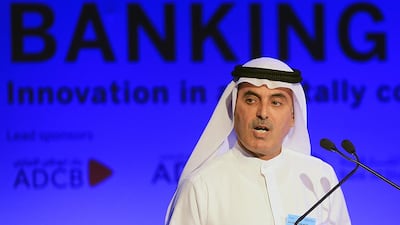Bank lenders should only advance credit to UAE corporations on the basis of reliable cash-flow figures, according to one of the most senior bankers in the region.
Abdul Aziz Al Ghurair, chairman of the UAE Banks Federation, said that all UAE companies – from the largest government-owned enterprise (GRE) through to small private outfits – should be subject to stringent cash-flow analysis before being allowed to borrow cash.
“The banks have to go on cash flow, it doesn’t matter who owns it, from family companies to GREs. It is for the protection of the banks. The biggest risk they face is customer default,” he said on the sidelines of a banking forum in Dubai.
Mr Al Ghurair, who is also chief executive of Dubai-based Mashreq bank, said that tough lending conditions were necessary to prevent a repeat of the financial crisis of 2009, when the fallout from the global credit crunch hit UAE banks hard, especially in Dubai.
Many corporates, especially in the property sector, had borrowed on the basis of reputation and asset-backing, which proved to be illusory when growth came to a sudden halt
“Hopefully, the banks have learnt a lesson and will not be as aggressive as before. The GREs now are not so aggressive because they’ve linked borrowings to cash flow,” he added.
His comments come as Dubai gears up for another round of economic growth, with projects estimated at many billions of dollars in the pipeline over the next five years.
The Expo 2020 project on its own will cost US$43 billion, according to Deutsche Bank estimates based on government figures. A raft of other mega-projects, such as the Mall of the World, Mohammed bin Rashid City, and Dubai Canal, could at least double that estimated cost.
Last week, Meraas borrowed $4.2bn to help finance the $10.2bn cost of constructing the Dubai Parks and Resorts complex. Other GREs are thought to be in the process of negotiating big loans with international and local financiers to pay for the expansion plan, as well as considering other forms of capital raising such as initial public offerings and bonds.
Mr Al Ghurair said that UAE banks were now more adequately capitalised, with ratios of about 18 per cent. “They should not require any additional capital requirement,” he said.
He added that the “easy liquidity” existing in current markets in the region was “good for business, good for the banks and good for customers”. But Mr Al Ghurair warned that small to medium enterprises (SMEs) would have to face even tougher standards to secure bank loans.
“SMEs will need higher standards of corporate governance than they have now. They will have to show a strong balance sheet and get to a stage where they’re properly established.”
Many SMEs in the UAE have faced problems with getting bank loans for new or expanding small businesses. Standard Chartered recently pulled out of the SME credit sector altogether.
The Middle East Banking Forum heard that SMEs were the “backbone of GDP growth worldwide”, according to James Gohary, Middle East regional manager for the International Finance Corporation.
Most bankers at the forum – 63 per cent of the audience – believed that SMEs suffered from a lack of transparency. Existing financial accounts make it hard for lenders to make informed decisions, the forum heard.
fkane@thenational.ae
Follow The National's Business section on Twitter

